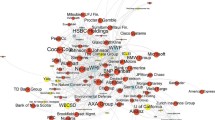Abstract
In this comment, I analyze Damania's political economy model (Environmental and Resource Economics 13: 415–433, 1999), correcting some flaws and clarifying some ambiguities. I arguethat the political parties are identical at the outset of the game. Onlyafter the parties have chosen the instrument (standards or taxation) and thestrictness of environmental policy do the environmentalists and thepolluting firms know which party to support in the election campaign. Inequilibrium, both parties choose the same platform, so that both have anequal probability of winning the election.
Similar content being viewed by others
References
Damania, R. (1999), 'Political Competition, Rent Seeking and the Choice of Environmental Policy Instruments', Environmental and Resource Economics 13, 415–433.
Dijkstra, B. R. (1998a), 'A Two-Stage Rent-Seeking Contest for Instrument Choice and Revenue Division, Applied to Environmental Policy', European Journal of Political Economy 14, 281–301.
Dijkstra, B. R. (1998b), 'Cooperation by Way of Support in a Rent Seeking Contest for a Public Good', European Journal of Political Economy 14, 703–725.
Dijkstra, B. R. (1999), The Political Economy of Environmental Policy: A Public Choice Approach to Market Instruments. Edward Elgar, Cheltenham, UK.
Heyes, A. and B. R. Dijkstra (2001), 'Interest Groups and the Demand for Environmental Policy', in T. Tietenberg and H. Folmer, eds., The International Yearbook of Environmental and Natural Resource Economics 2001/2002, pp. 150–178. Cheltenham, UK: Edward Elgar.
Hillman, A. L. and H. W. Ursprung (1988), 'Domestic Politics, Foreign Interests, and International Trade Policy', American Economic Review 78, 729–745.
Hillman, A. L. and H. W. Ursprung (1992), 'The Influence of Environmental Concerns on the Political Determination of Trade Policy', in K. Anderson and R. Blackhurst, eds., The Greening of World Trade Issues (pp.195–220). New York: Harvester Wheatsheaf.
Hillman, A. L. and H. W. Ursprung (1994a), 'Greens, Supergreens and International Trade Policy: Environmental Concerns on the Political Determination of Trade Policy', in C. Carraro, ed., Trade, Innovation, Environment (pp. 75–108). Dordrecht, The Netherlands: Kluwer Academic Publishers.
Hillman, A. L. and H. W. Ursprung (1994b), 'Domestic Politics, Foreign Interests, and International Trade Policy', American Economic Review 84, 1476–1478.
Hofer, T. and C. Woodruff (1994), 'Domestic Politics, Foreign Interests, and International Trade Policy: Comment', American Economic Review 84, 1474–1475.
Tullock, G. (1980), 'Efficient Rent Seeking', in J. M. Buchanan, R. S. Tollison and G. Tullock, eds., Toward a Theory of the Rent-Seeking Society (pp. 269–282). College Station, Texas: A&M
Author information
Authors and Affiliations
Rights and permissions
About this article
Cite this article
Dijkstra, B.R. Political Competition, Rent Seeking and the Choice of Environmental Policy Instruments: Comment. Environmental and Resource Economics 29, 39–56 (2004). https://doi.org/10.1023/B:EARE.0000035439.63411.68
Issue Date:
DOI: https://doi.org/10.1023/B:EARE.0000035439.63411.68




